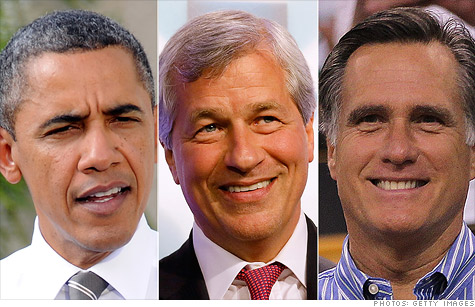The inconvenient but embarrassing fact that undercut the Obama camp's ad assault on Romney's time at Bain Capital--the GOP candidate was no longer at Bain when it shuttered the steel plant featured in the ad, but an Obama fundraiser was--only pointed up how futile a line of attack this probably is.
In this election, no one's really going to win the game of who's tougher on Wall Street.
Truth be told, Obama can't claim to be in much of a position of moral authority on this issue, as the story that broke this week about his former "favorite banker," Jamie Dimon of JPMorgan Chase, showed. Obama has always blown hot-and-cold about Wall Street--even waiting until the last minute to embrace the "Volcker Rule." And after Dimon admitted that JPMorgan had taken a giant loss on a risky trading position, the president went out of his way to express his respect for Dimon, telling The View: "JPMorgan is one of the best-managed banks there is. Jamie Dimon, the head of it, is one of the smartest bankers we got and they still lost $2 billion and counting."
No, as I write in an article in this week's National Journal, "The Humbling," the only good that may come out of all this back-and-forth is that it will remind politicians and policy-makers in Washington that, while they weren't watching, the Wall Street lobby has been relentless in poking ripping giant loopholes in financial reform.
Maybe now they'll wake up.
As
Sen. Jeff Merkley, D-Ore., co-author of the Volcker Rule, told me for that
story: "For two years Wall Street has had hundreds of lawyers working full time
to get the body of regulators to expand every possible loophole. ... People
don't understand that the Volcker rule is the closest thing we have to
Glass-Steagall," the Depression-era law that separated risk-taking investment
banks from commercial banks, Merkley said. "It is a firewall between hedge funds
and traditional banking. It stops banks from using deposits that are federally
insured or cheaper money from the Fed Discount Window and then gambling with
it."
This is not an issue that's going to deliver good political returns for either
the Democrat or the Republican (who has vowed to repeal Dodd-Frank). Which makes
it all the more sad that the issue is such an important one.

No comments:
Post a Comment